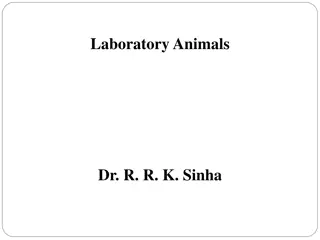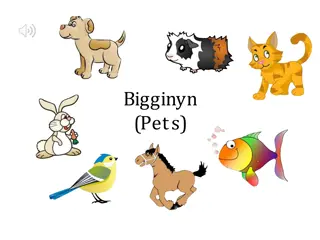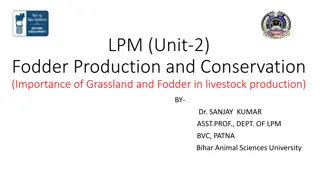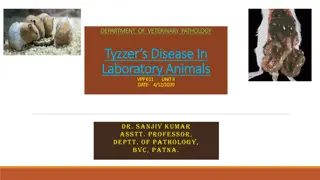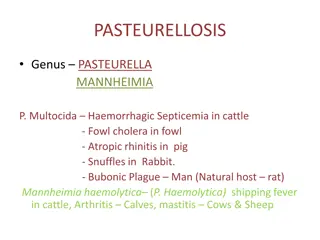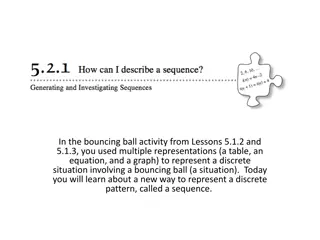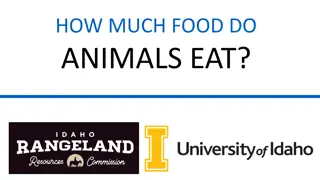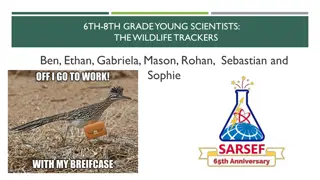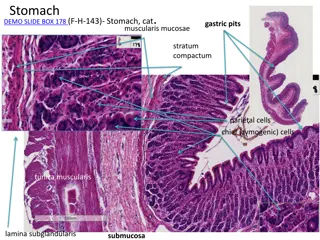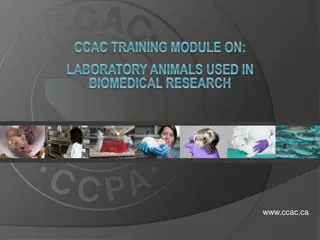Fodder production for small livestock units
Understanding the importance of feeds and fodders in animal production, adopting intercropping and backyard cultivation techniques to increase land productivity, and utilizing rabbits and poultry in traditional farming practices for resource-poor farmers.
0 views • 13 slides
Exploring Animal Tracks: A Visual Guide
Discover the fascinating world of animal tracks through detailed images and descriptions. Learn about various tracks left by caribou, sheep, red foxes, gray wolves, squirrels, rabbits, weasels, and more. Find out about the size, movement patterns, and activity times associated with each type of trac
0 views • 7 slides
Genetic Linkage and Crossing Over Problems in Various Organisms
This content presents genetic problems on linkage and crossing over in different organisms such as corn, tomato, Drosophila, and rabbits. It describes the traits involved, crosses performed, and results obtained to calculate crossing over frequencies and distances between linked genes. The examples
0 views • 8 slides
Understanding Laboratory Animals and Their Classification
Laboratory animals play a crucial role in scientific research due to their physiological similarity to humans. Common types include mice, rats, hamsters, guinea pigs, rabbits, and monkeys. They are classified into conventional and gnotobiotic animals based on their microbial status. Specific pathoge
1 views • 67 slides
Discover Different Pets - Bigginyn, Moddey, and More!
In this collection, you'll find images of various pets including Bigginyn, Moddey (dogs), Kayt (cats), Eeast (fish), Conning (rabbits), and Muc Rangagh (guinea pig). Each image is tagged with its name and whether the speaker has that pet or not.
0 views • 26 slides
Importance of Green Fodder in Livestock Production by Dr. Sanjay Kumar
Fodder, essential for livestock like cattle, rabbits, and horses, includes hay, silage, and fresh forage plants. Green fodder provides easily digestible nutrients, essential for animal health and milk production. While concentrates may boost production, green fodder remains economical and vital due
1 views • 11 slides
Fascinating Facts About Rabbits: Cute, Fluffy, and Record Holders
Learn about the adorable world of rabbits, from their cute and fluffy nature to interesting facts and records. Discover how rabbits make great pets, the importance of companionship for bunnies, and astonishing records like the oldest and longest rabbits ever known.
0 views • 7 slides
Insights into Tyzzer's Disease: An Overview of a Bacterial Infection in Laboratory Animals
Tyzzer's disease is an acute bacterial infection affecting rodents and rabbits, caused by Clostridium piliforme. Discovered in 1917 by Ernest Tyzzer, the disease is characterized by necrotic lesions in the caecal mucosa, liver, and heart. Initially known as Bacillus piliformis, it was later renamed
2 views • 21 slides
Understanding Pasteurellosis: A Bacterial Disease in Livestock
Pasteurellosis, caused by organisms like Pasteurella and Mannheimia, affects various animals including cattle, fowl, pigs, and rabbits. The disease presents as haemorrhagic septicaemia in cattle, with symptoms like high fever and respiratory distress. It is an important bacterial disease in livestoc
0 views • 30 slides
Exploring Day One of the Imagine It Reading Series Grade 2, 2008
In Day One of the Imagine It Reading Series Grade 2, 2008, the story follows a group of friends who spot four tiny rabbits on their way home from school. The rabbits are cleverly hidden under a bush, blending in with the surroundings. The engaging narrative captures the excitement of discovering nat
1 views • 97 slides
Exploring Sequence Patterns Using Different Representations
Samantha explores sequence patterns with a sequence-generating machine starting with 2 rabbits. She analyzes the pattern, predicts the next terms, and starts a new sequence with an initial value of 5. Join her in creating and organizing sequence families based on growth patterns, finding sequence ge
0 views • 6 slides
Fascinating Superstitions in Great Britain
Discover a range of intriguing superstitions in Great Britain, from food beliefs like pushing a spoon through a boiled egg to ward off the devil, to table superstitions involving cutlery and tablecloths. Explore animal superstitions involving bears, bats, ravens, sparrows, black and white rabbits, a
0 views • 11 slides
Power of Regeneration in Nature and Beyond
Explore the fascinating world of regeneration as seen in different organisms such as sea sponges, plants like rose bushes, earthworms, starfish, salamanders, and even mammals like rabbits and humans. Discover the remarkable ability of these creatures to regenerate and recover from injuries, highligh
0 views • 15 slides
Introduction to Abstraction Techniques using Foxes and Rabbits Simulation
Explore the benefits of simulation in predicting wildlife impact and balance in predator-prey relationships through a Java program simulating foxes and rabbits. Learn about important classes, behaviors of rabbits, and the overall simulation setup.
2 views • 53 slides
Rabbit Production Guide by Josh Schaeffer
In this comprehensive guide by Josh Schaeffer, you will learn about different types of rabbit production including fanciers pets, breeding stock, show animals, laboratory fur/hair, Angora, Rex, and meat rabbits. The guide covers the basics of raising meat rabbits, breed selection, general management
0 views • 23 slides
Understanding Gastrointestinal Disease in Rabbits: A Comprehensive Overview
Gastrointestinal diseases are common in pet rabbits and can lead to serious health issues. Factors such as decreased motility, bloat, obstruction, and diarrhea affect their digestion. Understanding the complexities of rabbit physiology, nutritional requirements, and signs of GI disease is crucial fo
0 views • 15 slides
Peter Rabbit Drama Activities: A Tale of Mischievous Adventures
Once upon a time, there were four little rabbits named Flopsy, Mopsy, Cotton-tail, and Peter, who lived with their Mother under a fir tree. Peter's mischievous adventures lead him into Mr. McGregor's garden, where he encounters thrilling chases and unexpected friends. Explore the drama activities ce
0 views • 11 slides
How Much Food Do Animals Eat? Daily Consumption Explained
Forage demand varies among animals based on their digestive systems. Hind-gut fermenters consume around 2.5% of their body weight in dry matter forage per day, while ruminants consume 3.0%. Examples provided include cows eating 20% of their body weight, horses eating 3.0%, and rabbits eating 3% dail
0 views • 5 slides
Young Scientists Investigate Wildlife Behavior and Habitat Effects
The Wildlife Trackers, a group of young scientists, conducted a study to understand how the presence of people and different habitats affect the behavior and flight responses of animals in their neighborhood. By measuring flight response distances of various animals like birds, lizards, and rabbits,
0 views • 11 slides
Various Stomach Anatomy Slides of Different Animal Species
Explore a series of detailed histological slides showcasing the stomach anatomy of different animal species including cats, rabbits, dogs, pigs, sheep, and goats. The images highlight key features such as gastric pits, mucosal layers, chief and parietal cells, proper gastric glands, cardiac and pylo
0 views • 29 slides
Challenges Faced by American Pikas in a Changing Climate
The American Pika, a small mammal related to rabbits, is facing challenges due to climate change. Warmer temperatures are pushing their alpine habitat higher, leading to habitat loss and food scarcity. Declining populations, impact from predators, and mismatches in breeding and food availability are
0 views • 10 slides
Understanding Olfaction: The Sense of Smell in Animals and Humans
Olfaction, the sense of smell, plays a vital role in animals like dogs and rabbits for environmental warning. Humans and primates, although microsomatics, also rely on smell for pleasure and food enjoyment. The olfactory system, including the olfactory mucosa's histological structure and specialized
0 views • 13 slides
Training Module on Laboratory Animals in Biomedical Research
This training module focuses on the utilization of laboratory animals in biomedical research, covering various species such as rodents, rabbits, birds, amphibians, and more. It emphasizes understanding different animal models, controlling experimental variables, and outlining responsibilities within
0 views • 34 slides



